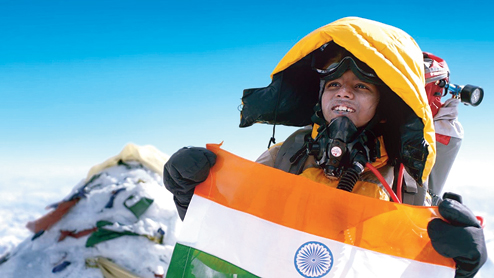
POORNA (U)
Director: Rahul Bose
Cast: Aditi Inamdar, Rahul Bose,
S. Mariya, Dhritiman Chaterji
Running time: 100 minutes
What were you doing when you were 13? I was battling a lost cause of passing in math. I ended up getting 16…. out of 100. You were probably doing much better than me, but you definitely weren’t climbing Mount Everest!
Poorna is a story about Poorna Malavath (Aditi Inamdar), a 13-year-old Adivasi girl from a village in Telangana. She learnt about our patriarchal society pretty early in her life — her father was looking to get her married and then the uncle who thinks sending girls to school is inconvenient because ‘Who’d sweep the house then?’
Her cousin Priya (S. Mariya) tells Poorna about government schools, where you can not only study but also have a hearty meal. Priya eventually gets married off, but not before making a deep impact on her sister’s life.
Priya makes as big an impact off-screen too. As the outspoken and protective elder sister, she’s one of the standout performers in the film. The easy comfort and camaraderie between the two sisters is one of the highest points and one wishes there was more of the two in Poorna.
Poorna’s father finally agrees to take her to the school, but only because he can’t afford his daughter’s wedding at the moment. Well, the school isn’t as hunky-dory as was told to her and the kitchen staff behaves like a Donald Trump when Poorna asks for an egg!
Enter, R.S. Praveen Kumar (Rahul Bose), who comes into the picture and immediately changes the plight of the school and its staff, with a wave of a magic wand. Kumar, an idealist, asked for a transfer from IPS to the Social Welfare Department because he wanted to change the general sense of indifference towards children in these schools. Kumar’s character is intense but the only problem is that, at times, his story threatens to take the focus away from Poorna.
Poorna finds out that her family wants to get her married and goes off to a rock-climbing camp from school, just to avoid her potential suitors. Her supervisers at the camp realise she has quite a flair for rock climbing and Kumar pulls a lot of strings to set up an expedition to Mount Everest for the best climbers of the school. He hopes it can set an example to the other students and bring down the rate of school dropouts.
The second half of the movie primarily focuses on the Everest expedition and if you like the mountains, the cinematography (by Subhransu) is beautiful. From the snow-clad mountains to the toy trains in Darjeeling, you’d be forgiven if you come out of the auditorium planning a trip to the hills. The camerawork during the final moments of the summit makes you feel like you’re part of the expedition team and you can feel the snow even in the Calcutta summer.
And yes, Poorna eventually makes the climb and becomes the youngest-ever girl to climb Mount Everest. The moment she was standing tall at 8,848 metres, she was also standing on every social construct against women, that she grew up facing up to.
It’s a story that needed to be told. And a story worth telling again and again and again.
The only problem is that we all knew it was going to happen, right? The biggest challenge of the film was to create an element of doubt, anxiety, surprise… all leading to that moment of euphoria. But it does seem to unfold a tad matter of fact.
Make no mistake, Poorna is well worth a watch and Bose as the director does a fine job. With plenty of Sheroes in India and filmmakers like him showing an interest in their stories, there’s plenty of reason to be optimistic.
Rwitoban Deb










